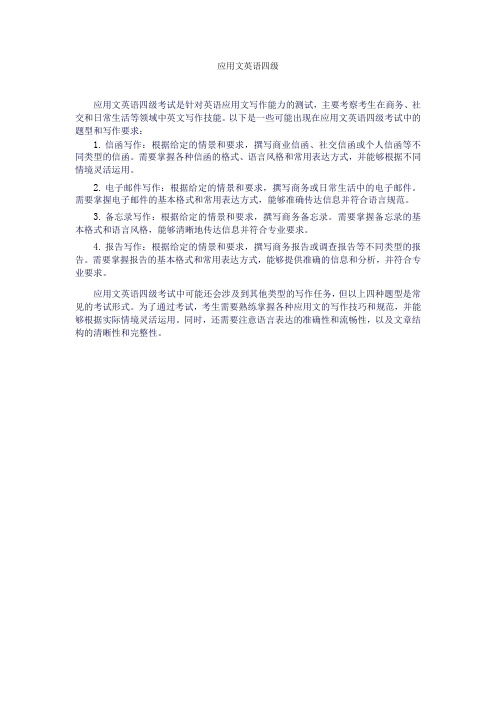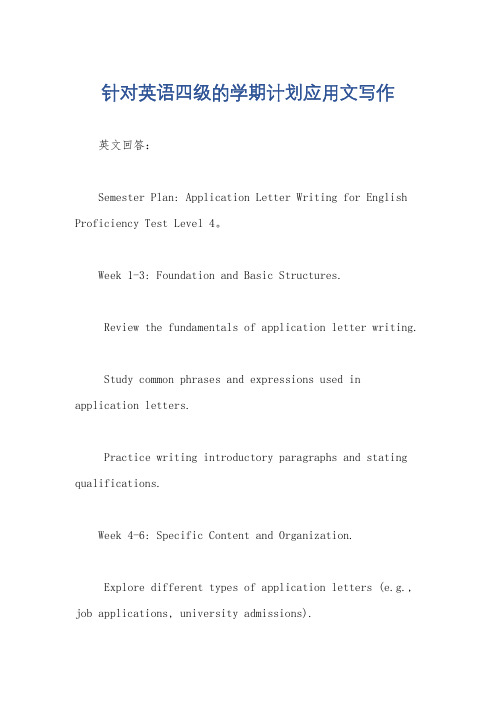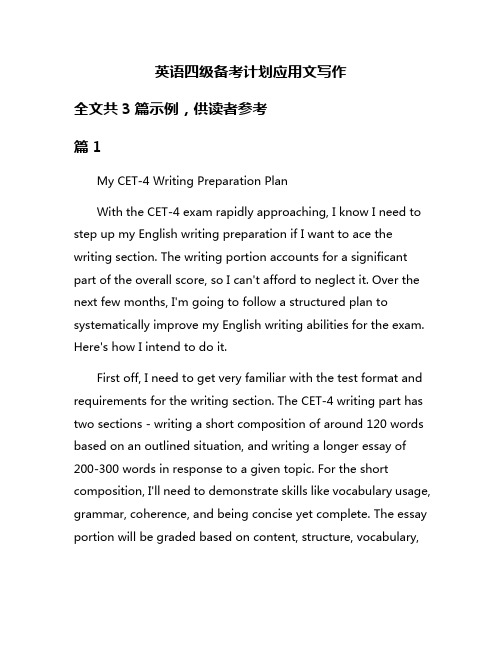四级应用文写作
大学英语四级应用文写作

⑼As far as the preparation is concerned,you should on the one hand review all the required lessons.⑽ On the other hand, you’d better spend some time on English.⑾ Only by careful preparations can you hope to enroll in our university.
一、书信的格式
应用文的一个最大特点是具有固定的格式和惯用 的语句,考生必须遵循一定的书写格式和行文方法。 下面首先针对书信的格式进行讲解。
一、书信的格式
信头(Heading) 信头包括发信人的单位名称、地址和发信日期等。发信人
的信息应写在信纸的右上方,遵循“由小到大”的原则,如 第一行写门牌号码、街道名,第二行写区名、城市名、省 (州)名,若是寄往国外,还要在下一行写国名。著名城市 可不必写省名。
此外,信头一般采用并列式,即各行开头一律左对齐。
信头(Heading)
信头部分有两点要特别注意: 第一,在标注写信日期时,最好避免如 2/12/2006 这样的写法,以免引起歧义。因为这在美 国人看来是2月12日,而在英国人看来则是12月2日。 第二,在四、六级考试中,无论要求中有无写明, 日期是一定要给出的。因为缺少日期,是书信格式不 合格的一种表现,会被扣除一定的分数。
称呼(Salutation) 称呼应比信内地址低两行,靠左边顶格自成一行。
称呼后面美国人习惯加冒号,英国人习惯加逗号, 两种写法皆可。如:
Dear Proferssor, (英式) Dear President:(美式) 最常用的称呼是:Dear+(头衔)+姓或名,如:
应用文英语四级

应用文英语四级
应用文英语四级考试是针对英语应用文写作能力的测试,主要考察考生在商务、社交和日常生活等领域中英文写作技能。
以下是一些可能出现在应用文英语四级考试中的题型和写作要求:
1.信函写作:根据给定的情景和要求,撰写商业信函、社交信函或个人信函等不同类型的信函。
需要掌握各种信函的格式、语言风格和常用表达方式,并能够根据不同情境灵活运用。
2.电子邮件写作:根据给定的情景和要求,撰写商务或日常生活中的电子邮件。
需要掌握电子邮件的基本格式和常用表达方式,能够准确传达信息并符合语言规范。
3.备忘录写作:根据给定的情景和要求,撰写商务备忘录。
需要掌握备忘录的基本格式和语言风格,能够清晰地传达信息并符合专业要求。
4.报告写作:根据给定的情景和要求,撰写商务报告或调查报告等不同类型的报告。
需要掌握报告的基本格式和常用表达方式,能够提供准确的信息和分析,并符合专业要求。
应用文英语四级考试中可能还会涉及到其他类型的写作任务,但以上四种题型是常见的考试形式。
为了通过考试,考生需要熟练掌握各种应用文的写作技巧和规范,并能够根据实际情境灵活运用。
同时,还需要注意语言表达的准确性和流畅性,以及文章结构的清晰性和完整性。
四级作文(书信类)

more likely to find well-paid jobs.
In order to study at the Department of Computer Science, you have to meet the
following requirements. First of all, you have to reach the minimum score set for
Yours sincerely, XXX
例Letter in Reply to a Friend(2003年12 月) Directions: For this part, you are allowed 30 minutes
to write a letter in reply to a friend’s inquiry about applying for admission to your college or university. You should write at least 120 words according to the outline given below in Chinese:
the required lessons. On the other hand, you’d better spend some time on English.
Only by careful preparations can you hope to enroll in our university.
第三段:首句仍为主题句,引起听众的注意。景点描 述部分语言平实简练、表达畅通。最后是总结句,用 In a word…引导。
例Welcome to Our Club (2007.6)
大学英语四级写作讲解应用文

Para2
The cartoon deeply illustrates a social issue which is catching more and more attention from the general public currently. What prove to be the reasons leading to it? 3 reasons stated as follows can be taken be accountable for it. First and foremost,(阐释具体的现象或原因) more importantly, (阐释具体的现象或原因), last but not the least.
大学英语四级写作
Review
漫画作文写法
第一段:描图, 第二段:对图画所反映的现象进行解释, 第三段:个人就此发表看法或提出观点。
第一段:描图: 对图画的内容进行具体的描述好句子)
1.What a vivid cartoon it proves to be! 2.The underlying meaning embodied in it can not be underrated, in that the cartoon reflects a not uncommon social issue, from which we can clearly observe that… 3. How impressive the cartoon is in describing the most widespread social phenomenon concerning the independence of the children.
New lesson
应用文写作--海报

四级应用文写作---海报1. 模板Dear____(称呼),①___(主办单位)will____(某项活动). This activity aims to____(活动目的).①点明活动的时间、地点、目的及主办单位②The arrangement goes as follows. First,____(安排1). Second, ____(安排2). Third,____(安排3).②活动的具体安排③Any student who____(修饰语)is welcomed. Please contact us at____(电话)or send e-mail to____(信箱). ____(主办单位)③如何报名参加活动2. 示例(真题)Directions: For this part, you are allowed 30 minutes to write a poster recruiting volunteers. You should write at least 120 words following the outline given below:1.校学生会将组织一次暑假志愿者活动,现招聘志愿者2.本次志愿者活动的目的、内容、安排等3.报名条件及联系方式【背诵范文】V olunteers NeededDear fellow students,The Students' Union of our university will organize a social practice to teach computer science in a village school during the summer holiday and now is recruiting volunteers. This activity aims to teach the students in the village knowledge about computer.The arrangement of this activity goes as follows. First, the volunteers will work as teachers in the school for three weeks. Second, the volunteers will publicize knowledge and operation of computers by lectures and distribution of materials in the school. Third, the volunteers are responsible for maintaining the computers of the school.Any student who is interested in this activity and has a good command of computer science is welcomed. Please contact us at 8765-4321 or send an e-mail to senior@. We are waiting for you!The Students' Union【亮点词汇】1) recruit v. 招募2) publicize v. 宣传3) distribution n. 分发4) be responsible for doing sth.负责做某事5) maintain v. 维护,保养6) have a good command of...对……掌握得很好【文章点评】第一段直接点题,校学生会招募志愿者暑期去乡村小学进行计算机帮教活动。
四级英语写作应用文写作(图表-漫画)公开课获奖课件百校联赛一等奖课件

2) 描述详细数据变化
•
increase/decrease by...
•
increase from ... to...
•
increase steadily from...
•
There was a marked increase
in ...
•
There has been a rapid
increase in ...
hand, ...On the other hand, ...
•
The rapid growth of ... owes much to...
•
lie in
• (2) In recent years, the time students using computers has increased greatly. (2023.6 CET-4)
• 第二段分析引起变化旳原因,主题句一般表达引起这种变化旳 原因有几点.例如:
•
(1) There are many factors that have stimulated this huge
place in ...
•
From the above table it can be seen that...
•
As it is shown in the table,...
•
According to the graph, ...
•
It is clear from the table that ...
increased 4%.
•
总之,挑选有说服力旳数据,主要是首尾两端数字或其增减值.
3. 强调数据间旳关系,突出变化
• 发觉数据旳变化规律,引用了经典数据,还须进一 步强调突出这种变化,使论证更有力.以 "Student Use of Computer"为例,有学生写到:But in 2023, students spent nearly 20 hours per week on the computer. This number was ten times that of 1990 and five times that of 1995. 像这么用倍数或百分 比更能阐明问题,给人留下深刻印象.
针对英语四级的学期计划应用文写作

针对英语四级的学期计划应用文写作英文回答:Semester Plan: Application Letter Writing for English Proficiency Test Level 4。
Week 1-3: Foundation and Basic Structures.Review the fundamentals of application letter writing.Study common phrases and expressions used in application letters.Practice writing introductory paragraphs and stating qualifications.Week 4-6: Specific Content and Organization.Explore different types of application letters (e.g., job applications, university admissions).Analyze sample application letters and identify their structure and content.Develop strategies for organizing and presenting information effectively.Week 7-9: Style and Tone.Learn the importance of using formal language and avoiding colloquialisms.Practice writing in a professional and persuasive tone.Pay attention to grammar, vocabulary, and sentence structure.Week 10-12: Refining and Feedback.Seek feedback from others on written application letters.Identify areas for improvement and revise drafts accordingly.Practice proofreading and editing for errors.Week 13-15: Practice and Mock Tests.Conduct timed writing exercises to simulate test conditions.Take mock tests and analyze performance to pinpoint strengths and weaknesses.Develop strategies for time management and stress reduction.Week 16-18: Review and Final Preparation.Review key concepts and practice answering potential questions.Build confidence and reduce anxiety by visualizingsuccess.Familiarize oneself with the exam format and time constraints.中文回答:学期计划,英语四级应用文写作。
英语四级备考计划应用文写作

英语四级备考计划应用文写作全文共3篇示例,供读者参考篇1My CET-4 Writing Preparation PlanWith the CET-4 exam rapidly approaching, I know I need to step up my English writing preparation if I want to ace the writing section. The writing portion accounts for a significant part of the overall score, so I can't afford to neglect it. Over the next few months, I'm going to follow a structured plan to systematically improve my English writing abilities for the exam. Here's how I intend to do it.First off, I need to get very familiar with the test format and requirements for the writing section. The CET-4 writing part has two sections - writing a short composition of around 120 words based on an outlined situation, and writing a longer essay of 200-300 words in response to a given topic. For the short composition, I'll need to demonstrate skills like vocabulary usage, grammar, coherence, and being concise yet complete. The essay portion will be graded based on content, structure, vocabulary,grammar, and overall fluency. Knowing these criteria will allow me to focus my preparation appropriately.One of the biggest challenges I face is improving my linguistic competency - especially enriching my vocabulary and honing my grammar skills. I plan to set aside dedicated time each day to systematically study common lexical chunks, idiomatic expressions, academic phrases, and grammatical structures that are likely to appear on the exam. Using apps, websites and books specifically designed for CET preparation will give me ample practice exercises to drill these aspects.However, rote memorization alone won't cut it. I need to get plenty of practice applying this knowledge in actual writing scenarios. For the daily composition practice, I'll go through model essays and outline the structure, make note of transitional words used, observe how ideas are developed coherently, and analyze techniques for writing engaging introductions and conclusions. Then I'll try to replicate these elements in my own writing while swapping the topics and content.I also need to work on time management, as the CET writing tasks have to be completed within a specified duration. Setting a timer and doing timed writing exercises frequently will help build my skills in this area. I'll assess which areas slow me down - is itstruggling to quickly organize my thoughts, paralysis in starting the piece, overly laboring on word choices, or getting stuck on certain grammatical constructions? Identifying and resolving my personal bottlenecks here is key.In addition to practicing on my own, I plan to get regular feedback from teachers, peers, and online writing tutors. Having a fresh set of eyes critique my work can reveal blind spots in my writing that I may be oblivious to. I'll make use of campus writing centers as well as affordable online tutoring services to get this valuable external perspective and personalized advice.Reading also can't be neglected if I want to broaden my linguistic skills. I'll read material from high-quality English publications, journals, well-written blogs and books to get exposed to proper writing styles and soak in vocabulary in context. Dissecting how accomplished writers seamlessly blend words into sentences and paragraphs will be very useful. Taking notes of impressive phrases, analyzing transition usage, and outlining essay structures will all contribute to my writing prowess.Leading up to the exam, I'll make a habit of attempting full Writing Section practice tests from previous CET exams and other sources. This will get me acclimated to the actual testenvironment and allow me to apply all my learning in a comprehensive manner. I can then objectively assess my areas of strength and weakness based on the scored results.Periodically, I'll give myself short breaks to refresh my mind and return to preparation feeling re-energized. Sustaining a good balance of practice, feedback, and focused rest will be vital to avoiding burnout and stagnation. Motivational self-talk, visualizing success and little rewards will also aid in keeping my spirits high when I inevitably face minor setbacks along the way.Ultimately, consistent daily practice with the right techniques is the crux of making substantial improvements to my English writing proficiency. But this isn't a solitary journey - staying connected with teachers, classmates, and peers who are all striving towards the common CET goal will create a supportive environment. Together we can push each other to gives our utmost best on the exam day.I feel extremely determined to execute this writing plan flawlessly over the next few months. The effort and sacrifices made today will undoubtedly translate into exceptional results in the long run. I'm excited to watch my progress unfold as I work through this step-by-step writing agenda. With clarity ofpurpose and steadfast discipline, scoring well on the CET-4 writing section is certainly an achievable target!篇2My CET-4 Writing Preparation PlanAs an English major student, passing the College English Test Band 4 (CET-4) is extremely important for my future career prospects. The writing section, in particular, requires substantial practice and preparation. In this essay, I will outline my comprehensive plan to ace the CET-4 writing tasks.First and foremost, I need to thoroughly understand the test format and requirements. The CET-4 writing section consists of two tasks: Writing a composition (30% of the total score) and writing a letter (15% of the total score). The composition could be an argumentative, expository, or descriptive essay on a given topic, while the letter involves writing either a semi-formal or informal letter based on a specific situation.To excel in the composition task, I must work on developing a strong essay structure. A well-organized five-paragraph essay with an introduction, three body paragraphs, and a conclusion is generally expected. The introduction should capture the reader's attention, provide background information, and present a clearthesis statement. Each body paragraph should focus on one main idea, supported by relevant details, examples, and logical reasoning. The conclusion should summarize the main points and restate the thesis in a compelling way.Regarding the letter task, I need to familiarize myself with the appropriate formatting, tone, and content for bothsemi-formal and informal letters. Semi-formal letters may involve writing to a company, organization, or authority figure, while informal letters are typically written to friends or family members. Proper salutations, closings, and language register are crucial for each type of letter.To improve my writing skills, I plan to follow a multi-pronged approach:Extensive Reading: Reading high-quality English texts, such as newspapers, magazines, and academic journals, will expose me to a wide range of vocabulary, sentence structures, and writing styles. I will actively note down new words, phrases, and expressions to incorporate into my writing.Writing Practice: Consistent practice is the key to mastering any skill, and writing is no exception. I will set a goal to write at least one essay or letter per week on various topics. This will helpme become more comfortable with expressing ideas coherently and concisely in English.Feedback and Revision: After completing each writing practice, I will seek feedback from my English professors, tutors, or peers. Their constructive criticism will help me identify areas for improvement, such as grammar, word choice, organization, and logical flow. I will revise my work based on their feedback, which will reinforce my learning.Model Essays and Letters: Studying well-written sample essays and letters from reliable sources will provide me with a better understanding of effective writing techniques. I will analyze the structure, language, and rhetorical devices used in these samples to enhance my own writing abilities.Time Management: During the actual CET-4 exam, time management is crucial. I will practice writing under timed conditions to develop the skill of expressing my thoughts clearly and concisely within the given time frame.Vocabulary Building: A strong vocabulary is essential for effective writing. I will create flashcards or usevocabulary-building apps to learn new words, idioms, and collocations regularly. Additionally, I will strive to use a diverse range of vocabulary in my writing practice.Grammar Review: While grammar is not directly tested in the CET-4 writing section, it plays a significant role in conveying ideas clearly and accurately. I will review grammar rules, focusing on areas where I tend to make mistakes, such as subject-verb agreement, verb tenses, and article usage.Peer Collaboration: Working with classmates who share the same goal can be extremely beneficial. We can exchange writing samples, provide feedback, and discuss strategies for improvement. This collaborative approach will not only enhance our writing skills but also foster a supportive learning environment.In addition to these strategies, I will explore online resources, such as writing blogs, forums, and websites dedicated to CET-4 preparation. These resources can provide valuable tips, sample materials, and guidance from experienced educators andtest-takers.Passing the CET-4 writing section requires dedication, consistent effort, and a well-structured preparation plan. By following this comprehensive approach, I am confident that I can develop the necessary skills to effectively communicate my ideas in written English and achieve a high score on the CET-4 writingtasks. This, in turn, will open up numerous opportunities for further academic and professional growth.篇3Acing the Writing Section: My CET-4 Preparation GameplanAs an English major gearing up for the CET-4 exam, one section fills me with trepidation more than any other – the writing. Those two dreadful essays looming over the exam strike fear into the hearts of even the most seasoned writers among us. How can we possibly convey our brilliance and mastery of the language within those constrictive time limits and vague prompts?Fear not, my fellow test warriors! I've been researching and developing a comprehensive gameplan to conquer this writing Everest. By incorporating the right strategies and mindset, we can walk into that exam confident that our pens will weave linguistic magic.First things first, we need to analyze the enemy. What exactly are the examiners looking for in these writing samples? After poring over previous tests and scoring rubrics, a few key elements emerge:Organization and logical flow of ideasGrammatical accuracy and range of vocabularyAdhering to the assigned topic and task requirementsCoherence, cohesion, and transitions between thoughtsRather than aimlessly practicing essays, we must systematically target and improve upon each of these areas. Let's break it down:Organization is paramount. We need a battle-tested template to structure our writing in a clear, logical manner that guides the reader. I recommend the classic 5-paragraph format: an engaging introduction, 3 body paragraphs, and a synthesizing conclusion. By nailing this framework, we provide a readable roadmap rather than a muddled stream of consciousness.Next up, grammar and vocabulary. The CET-4 loves to test our range, so we must50expand our arsenal of transitional phrases, idioms, and advanced vocabulary. I've been building custom flashcard decks and quizzing myself daily on these linguistic tools. Mistakes in grammar or using overly simple words are a fast-track to point deductions.Adhering to the prompt sounds easy in theory, yet many test-takers fumble by going off on tangents. We must practice laser-focused responses that directly address the task at hand,no matter how closed or open-ended. I suggest underlining or highlighting all components of the essay prompt, and referencing it frequently during writing to ensure comprehensive coverage.The final key is coherence and flow. Our arguments and examples must smoothly tie together, with logical bridges joining each concept. Transitions like "additionally", "in contrast", and "for instance" are crucial for this. I've also found that techniques like outlined planning and reverse-outlining can help us organize and sequence ideas.With the criteria understood, the next step is to practice...A LOT. My strategy involves timed writing exercises using actual past prompts, grading myself against the rubrics, and analyzing areas for improvement. I set aside dedicated blocks each week for this training, challenging myself to work under authentic exam constraints. It's incredible how much more fluent my writing has become with this repeated exposure.During this practice phase, I cannot overstate the value of targeted feedback. Having teachers, writing tutors, and qualified peers review my work has accelerated my growth exponentially. An outside perspective highlights gaps and habits I could notperceive myself. I've even joined an online CET-4 writing group where we exchange essays for reciprocal critiques.In terms of content, we need a stockpile of exemplary sample essays to model our own writing after. I've compiled high-scoring examples across a variety of themes like education, technology, culture, and environment. Studying their techniques for introductions, thesis statements, body paragraphs, concluding remarks, and use of evidence has been invaluable. Where possible, I've even tried to emulate the admirable writing while making it my own.Time management is also crucial on test day. In my practice sessions, I've been getting used to budgeting my time per essay component. For instance, 10 minutes for outlining and planning, 25 minutes for writing the body paragraphs, 5 minutes for the intro and conclusion. Having a solid timeboxing system prevents me from wandering off track or running out of time before completing both essays.In the final stretch before the exam, my plan includes some mental conditioning as well. Plenty of rest, positive visualization, calming exercises, and strategic nutritional choices will ensure I'm feeling my best come test day. The mind and body work in tandem, so nurturing both is vital.As I step into that exam room, pens metaphorically blazing, I'll remember one key mantra: Confidence, not arrogance. Yes, I've prepared diligently and have full command of the skills needed to succeed. However, I'll couple that self-assurance with level-headedness and humility, reminding myself that the test is simply an opportunity to validate my hard work.With this gameplan, I'm ready to face the writing Goliath. Those two essays don't seem quite so daunting anymore. Let's show the examiners what we're capable of, one beautifully structured paragraph at a time! Who's with me?。
- 1、下载文档前请自行甄别文档内容的完整性,平台不提供额外的编辑、内容补充、找答案等附加服务。
- 2、"仅部分预览"的文档,不可在线预览部分如存在完整性等问题,可反馈申请退款(可完整预览的文档不适用该条件!)。
- 3、如文档侵犯您的权益,请联系客服反馈,我们会尽快为您处理(人工客服工作时间:9:00-18:30)。
关于四级应用文写作应用文是指在日常生活和工作中使用的文体,包括书信类和告示类。
2001年6月至2005年12月共有11次四级考试,其中6次考的是应用文写作。
大学英语四六级考试委员会声明:以后的四六级侧重考查考生的英语实际运用能力,应用文成为考查的重点题型。
一、写作格式英语写作格式一般分为齐头式和缩进式两种,两种方式在四级写作中均可采用。
1.齐头式美国英语和现代英语,尤其是商务英语中常用的写作格式,段与段之间空一行,每段第一行顶头写。
书信作文的称呼、正文、落款均顶头书写。
如下例:Dear Xiaoqiang,I’m glad to ….Some requirements are ….…Yours sincerely,Li Ming2. 缩进式是英国英语和传统英语中常用的写作格式,段与段之间不空行,每段第一行向后缩进4-8个字母,每段第一行应缩进相同距离。
书信作文称呼顶头写,正文缩进,落款位于中间偏后的位置。
这是我们常用的书信格式。
二、书信写作书信是重要的交际工具,通常分为私人信函和公务信函两大类。
私人信函一般是写给朋友或同学的;公务信函一般谈论或处理重要事务,可能是推荐信、求职信、求学信、邀请信、询问信、回复信、投诉信。
私人信函的格式和语气比较随便,而公务信函则正式得多。
四级写作考试一般只需从称呼写起,根据题目要求写出正文、结尾客套,签名统一用“李明”这个名字。
1.称呼一般用dear开头,注意头衔的使用。
英式英语称呼后用逗号,美式英语称呼后用冒号。
特别注意:四级英语写作一般要求称呼后使用逗号,不用冒号。
称呼一般分为两种情况:1)写给机构Dear Sir or Madam; Dear Mr. President; Dear Mr. Wang (使用全名或姓)2)写给个人关系不亲密:Dear Mr. President; Dear Mr. Want (使用全名或姓)关系亲密:Dear Michael (直呼其名)2.正文是书信中最重要的内容,也是应用文得分的关键。
四级应用文一般有三点提纲,即三个内容要点。
因此,考生应严格按照大纲要求写成三段,每段表达提纲中的一点,顺序不要打乱。
此外,书信作文首尾两段有一些固定句型可以使用。
首段写法:(写三句)1)改写提纲一;(1句)2) 自我介绍(1句):I’m a staff member form your company/corporation.I am a freshman/sophomore/junior/senior/undergraduate/graduate from the Department of …3) 写作目的(1句):I am writing the letter in purpose of placing an order of some books.我写这封信目的是为了订购一些书籍。
I am writing to inform you that I wish to resign from my current post/position.我写这封信是告诉你我想从目前的职位上辞职。
尾段写法:(写三句)1)改写提纲三:1句2)表示感谢(1句)。
个人建议信是回信,不用表示感谢。
其他书信一般均需表示感谢。
My thanks to you for your generous help are beyond words.千言万语也无法表达我对您慷慨帮助的感谢。
Words fail me when I want to express my sincere gratitude to you.言语是无法表达我对您的真诚感谢的。
I take this opportunity to show my heartfelt appreciation to the kind assistance you render me.借此机会,我要衷心地感谢您给予我的好心帮助。
3)期待回信:1句I look forward to hearing from you soon.I am looking forward to your favorable reply at your earliest convenience.我期待着尽快得到您好意的答复。
Your prompt attention t my inquiry would be highly appreciated.我将非常感谢您对于我的询问的迅速关注。
3.结尾客套通用“Yours sincerely,”。
4.签名书信类应用文最后一部分是签名,根据四级大纲,一般统一用“Li Ming”签名,千万不要把自己的真实姓名写上。
三、告示写作告示类应用文写法各不相同,但大致也有统一的格式和要求,一般要求下列格式:1.标题书信类不需要写标题,但告示类应用文必须写标题,这点非常重要。
2.日期书信类应用文不要求写出日期,但告示类应用文一般需要注明日期,写在标题下一行的右下方,右端与右边线对齐,常见写法为January 14, 2006, February 3,2007等。
3.正文根据题目要求,写一至三段。
1)常用时态现在时或将来时,可以使用现在进行时表示近期即将发生的事情,如is organizing; 也可使用动词不定式,如to be held; will/shall do, man/can do结构等。
2)开头句型* Your attention, please…* It has been decided that…* May I have your attention please?...* … is requested to note that…* …has/have the honor to announce…* …takes the pleasure in announcing that…* … has/have the pleasure to notice/announce (that)…* This is to note/notice/notify/announce that…* It is hereby noted/announced/proclaimed/made public that…* …is/are authorized to invite/announce/declare that…* Under the auspices of…, a report/lecture/seminar on … will be given by… on…* Owing to / due to / because of / in order to…, we beg to inform…that…* Under the auspices of…, …will organized / hold a …match / competition / contest between … and … on…4. 署名书信类应用文签名一般是个人,但告示类应用文可以是个人或公告单位的署名,实词第一个字母大写,虚词第一个字母小写,右端与右边线对齐。
书信类应用文在模拟试题中出现了多次,大家可参考答案所提供的范文进行学习。
告示类应用文现给予一个例子如下:海报(2006年6月17日考试真题)Directions: For this part, you are allowed 30 minutes to write a poster recruiting volunteers. You should write at least 120 words following the outline given below:1.校学生会将组织一次暑假志愿者活动,现招募志愿者;2.本次志愿者活动的目的、内容、安排等;3.报名条件及联系方式。
Volunteers NeededJune 17, 2006The Student s’Union is organizing a school-wide voluntary program during this summer vacation. Now volunteers are wanted.The following is the introduction to this program. First, the purpose of it is to improve student s’ ability and enrich after-class activities. Second, the Student s’Union will open free English classes for primary school students in a remote village in Sichuan Province. Last, the classes will last for a week. Currently, we will recruit 5 volunteers to work as English teachers.Those who are interested in taking part in the activity, please send your resume to the email address studentunion@ before June 20th. The Student Union will contact the chosen candidates for an interview before July 1st. Everybody is welcome to be present at the program.The Students’ Union。
